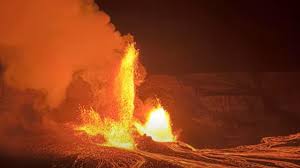Kilauea Volcano : Released Lava Fountains

The Kilauea volcano on Hawaii’s Big Island released lava fountains reaching over 1,000 feet into the air recently.
- Kilauea Volcano is one of the world’s most active volcanoes.
- It is a shield-type volcano located in the southeastern part of the island of Hawaii, Hawaii state, United States.
- The volcano rises 4,190 feet (1,227 meters) above sea level.
- The summit caldera contains a lava lake known as Halema`uma`u that is said to be the home of the Hawaiian volcano goddess, Pele.
- Kilauea has been erupting on a continuous basis since 1983.
- Kilauea’s frequent eruptions are usually nonexplosive and are contained within Halema‘uma‘u, which sometimes rises and overflows along the floor and flanks of the caldera proper.
- They are the largest volcanoes on Earth that actually look like volcanoes (i.e., not counting flood basalt flows).
- The Hawaiian shield volcanoes are the most famous examples.
- Shield volcanoes are almost exclusively basalt, a type of lava that is very fluid when erupted. For this reason, these volcanoes are not steep.
- They are broad volcanoes with gentle slopes.
- Eruptions at shield volcanoes are only explosive if water somehow gets into the vent; otherwise they are characterized by low-explosivity fountaining that forms cinder cones and spatter cones at the vent; however, 90% of the volcano is lava rather than pyroclastic material.




